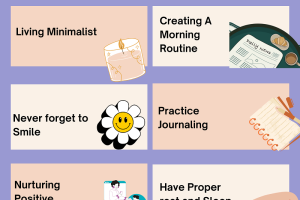Discover the Power of Holistic Living: Enroll in our Lifestyle Program

What is Holistic Living?
Holistic living refers to a lifestyle that seeks to balance and nurture all aspects of an individual—physical, emotional, mental, and spiritual. It’s an approach that recognizes the interconnectedness of these elements, promoting well-being not just in body but also in mind and spirit. Imagine waking up to the smell of fresh herbs, engaging in morning yoga, and preparing a nutritious breakfast with locally-sourced ingredients. This is the essence of holistic living—a harmonious blend that prioritizes wellness in every facet of life.
- Discover the Power of Holistic Living: Enroll in our Lifestyle Program
- What is Holistic Living?
- Importance of a Holistic Lifestyle
- Benefits of Holistic Living
- Physical Benefits
- Emotional and Mental Well-being
- Components of a Holistic Lifestyle
- Nutrition
- Fitness
- Mindfulness and Meditation
- Practicing Mindfulness
- Benefits of Meditation
- Holistic Approaches to Health
- Alternative Therapies
- Integrative Medicine
- Creating a Holistic Environment
- Decluttering and Organization
- Natural Living
- Joining a Lifestyle Program
- What to Expect
- Success Stories
- Developing a Holistic Routine
- Daily Practices
- Healthy Habit Formation
Importance of a Holistic Lifestyle
Embracing a holistic lifestyle can transform a person’s overall well-being. Here are some reasons why it’s essential:
- Sustainable Health: By focusing on all dimensions of health, individuals can prevent illness more effectively than through conventional methods alone.
- Enhanced Emotional Resilience: Holistic practices like meditation help manage stress and improve emotional stability.
- Stronger Connections: Living holistically encourages deeper connections with oneself, others, and the environment.
For many, adopting a holistic approach is not just a trend but a profound journey towards a fulfilling and balanced life. It’s about making conscious choices that lead to long-lasting happiness.
Benefits of Holistic Living
Physical Benefits
One of the most immediate advantages of holistic living is its impact on physical health. By prioritizing a balanced diet, regular exercise, and self-care, individuals often notice increases in energy levels and overall vitality. For example, a friend of mine transitioned to a plant-based diet and began practicing yoga regularly. In just a few months, she reported not only weight loss but also improved digestion and a greater sense of physical empowerment. Some key physical benefits include:
- Improved Immune Function: A well-rounded diet rich in nutrients can enhance your body’s defenses.
- Increased Energy: Regular physical activity can boost stamina and reduce fatigue.
- Better Sleep: Mindfulness and relaxation techniques can lead to more restful nights.
Emotional and Mental Well-being
The emotional and mental benefits of holistic living are equally significant. Engaging in holistic practices helps reduce stress and increase mental clarity. For instance, after incorporating daily meditation into my routine, I found my anxiety levels decreased dramatically, allowing me to handle challenges with a more positive outlook. Here’s how holistic living positively influences emotional health:
- Enhanced Self-Awareness: Mindfulness encourages individuals to connect with their thoughts and feelings.
- Stress Reduction: Practices like yoga and meditation are known to lower cortisol levels.
- Greater Resilience: A holistic approach fosters a mindset that is adaptable and less reactive to life’s challenges.
By nurturing both body and mind, holistic living creates a foundation for a healthier, more fulfilling life.
Components of a Holistic Lifestyle
Nutrition
Nutrition forms a vital cornerstone of a holistic lifestyle. It’s not just about counting calories or eliminating food groups but rather focusing on nourishing the body with whole, unprocessed foods. I remember when I started meal prepping with fresh vegetables and grains; not only did I feel more energized, but my cravings for unhealthy snacks significantly diminished. Key elements of holistic nutrition include:
- Whole Foods: Prioritize fruits, vegetables, nuts, seeds, and whole grains to provide essential nutrients.
- Mindful Eating: Pay attention to portion sizes and listen to your body’s hunger cues.
- Hydration: Water plays a crucial role in maintaining health—aim for at least eight glasses a day.
Fitness
Fitness is another essential element of holistic living, promoting physical well-being and mental clarity. Engaging in regular physical activity can take many forms, from structured workouts to outdoor activities. I discovered that hiking in nature not only challenged my body but also boosted my mood remarkably. Consider these approaches to fitness:
- Variety: Incorporate different forms of exercise, such as yoga, strength training, and cardiovascular workouts, to keep routines engaging.
- Consistency: Aim for at least 150 minutes of moderate aerobic activity each week, mixing in stretching and strength training exercises.
- Enjoyment: Choose activities that you truly enjoy; this will make it easier to stick with your fitness routine.
By embracing proper nutrition and fitness, individuals lay the groundwork for a healthier and more balanced life, resonating with the principles of holistic living.
Mindfulness and Meditation
Practicing Mindfulness
Integrating mindfulness into daily life can be transformative, fostering a greater sense of presence and awareness. Mindfulness is about tuning in to the present moment and fully engaging with whatever you are doing, whether it is eating, walking, or even brushing your teeth. I started practicing mindfulness during my morning coffee ritual. Instead of scrolling through my phone, I focused on the aroma and taste of the coffee, making me appreciate that simple moment more deeply. Here are some simple ways to practice mindfulness:
- Mindful Breathing: Take a few moments to focus solely on your breath, observing each inhalation and exhalation.
- Body Scan: Spend time noticing the sensations throughout your body, from your toes to the top of your head.
- Gratitude Journaling: Write down a few things you’re grateful for each day to shift your focus to positivity.
Benefits of Meditation
Meditation, a key aspect of mindfulness, offers numerous benefits for both the mind and body. When I first started meditating, even just five minutes a day, I noticed a significant reduction in my stress levels and an increase in clarity in my day-to-day decisions. Here are some notable benefits of meditation:
- Reduced Anxiety: Regular meditation practice can significantly lower the symptoms of anxiety and create a sense of calm.
- Enhanced Focus: Meditation strengthens attention span and concentration, making it easier to remain productive.
- Emotional Health: Practicing meditation improves emotional resilience and encourages a more positive outlook on life.
By incorporating mindfulness and meditation into a holistic lifestyle, individuals can cultivate peace, clarity, and emotional well-being.
Holistic Approaches to Health
Alternative Therapies
Exploring alternative therapies can greatly enhance one’s holistic health journey. These therapies often complement conventional treatments, focusing on the whole person rather than just isolated symptoms. For instance, when I was dealing with chronic headaches, I turned to acupuncture after a friend’s suggestion. The experience not only alleviated my pain but also provided a sense of relaxation I hadn’t anticipated. Some popular alternative therapies include:
- Acupuncture: Involves inserting needles at specific points to balance energy (Qi) in the body.
- Chiropractic Care: Focuses on spinal alignment to enhance overall health and reduce pain.
- Herbal Medicine: Utilizes natural plant-based remedies to treat various ailments.
Integrative Medicine
Integrative medicine combines conventional medical practices with alternative therapies to create a personalized and effective approach to health. It’s about finding a balance that best meets individual needs. I recently attended a wellness seminar that highlighted how integrative approaches can enhance overall healthcare experiences. Key principles of integrative medicine include:
- Whole-Person Focus: Treating physical, emotional, and spiritual aspects together.
- Patient-Centric Care: Involving patients in their treatment plans, thus empowering them.
- Collaborative Approach: Encouraging collaboration among healthcare providers from different disciplines.
By embracing alternative therapies and integrative medicine, individuals can foster a more balanced and comprehensive approach to health, enhancing their journey toward well-being.
Creating a Holistic Environment
Decluttering and Organization
Creating a holistic environment begins with decluttering and organization. A cluttered space can lead to a cluttered mind, making it hard to focus and feel at peace. I remember a time when my living room resembled a chaotic storage unit. After setting aside a weekend to declutter, I was amazed at how much lighter and more serene the space felt. Here are some tips for effective decluttering:
- Start Small: Choose one room or area to tackle first and break it into manageable tasks.
- The 5-Item Rule: Aim to remove five items from each space that you no longer need or use.
- Create Zones: Designate specific areas for different functions (e.g., relaxation, work) to maintain organization.
Natural Living
The next step in creating a holistic environment is embracing natural living. This involves surrounding yourself with natural elements and minimizing exposure to harmful chemicals. I made the switch to biodegradable cleaning products and found not only a reduced chemical smell in my home but also a newfound sense of wellness. Key components of natural living include:
- Indoor Plants: Incorporate houseplants, which can improve air quality and create a calming atmosphere.
- Natural Materials: Choose home furnishings made from organic or sustainable materials, such as bamboo or wool.
- Mindful Consumption: Be intentional about what you bring into your home, opting for eco-friendly and ethically sourced items.
By decluttering and embracing natural living, individuals can cultivate a holistic environment that supports mental clarity, emotional health, and overall well-being.
Joining a Lifestyle Program
What to Expect
Joining a lifestyle program that focuses on holistic living can be a transformative experience. When I first enrolled in a wellness program, I was unsure of what to expect, but I quickly learned that it was about much more than just diet or exercise. Typically, these programs offer a well-rounded approach, including education on nutrition, fitness plans, mindfulness practices, and community support. Here’s what you can generally expect:
- Structured Guidance: Expert coaches offer tailored plans to meet individual health goals.
- Holistic Workshops: Participants can engage in workshops covering various topics, like meal prepping, meditation, and stress management.
- Community Interaction: Engage with like-minded individuals for support and motivation.
Success Stories
Perhaps the most inspiring aspect of joining a lifestyle program is witnessing the success stories of others. One participant, Sarah, shared how she lost 30 pounds over six months by changing her eating habits and incorporating daily yoga. Her journey motivated many in our group to push through their challenges. Another participant, Mark, found relief from chronic anxiety through mindfulness practices introduced in the program, helping him regain control over his life. These success stories serve as powerful reminders that with dedication and the right support, positive changes are attainable, encouraging everyone on their own holistic health journey.
Developing a Holistic Routine
Daily Practices
Integrating a holistic routine into daily life can lead to profound transformations. The key is consistency and finding practices that resonate with you personally. When I decided to create a daily routine focused on holistic living, I started small by incorporating a few mindful practices each morning. For example, I began each day with a short meditation followed by a nourishing breakfast. Here are some daily practices to consider:
- Morning Meditations: Start your day with a few minutes of mindfulness to set a positive tone.
- Nutrient-Dense Meals: Focus on wholesome foods that fuel your body and mind throughout the day.
- Physical Activity: Incorporate at least 30 minutes of exercise, whether it’s a brisk walk, yoga, or dancing.
Healthy Habit Formation
Developing healthy habits is crucial for sustaining a holistic lifestyle. It takes about 21 days to form a new habit, and setting realistic goals is key. For instance, I aimed to drink at least eight glasses of water daily. By keeping a reusable water bottle handy, I found it much easier to stay hydrated! To foster healthy habit formation:
- Start Small: Choose one or two habits to focus on rather than overwhelming yourself.
- Use Reminders: Set alerts on your phone or use sticky notes to keep your goals in sight.
- Reward Yourself: Celebrate your successes, whether large or small, to motivate ongoing commitment.
By establishing daily practices and cultivating healthy habits, individuals can create a sustainable holistic routine that nourishes both body and soul.





